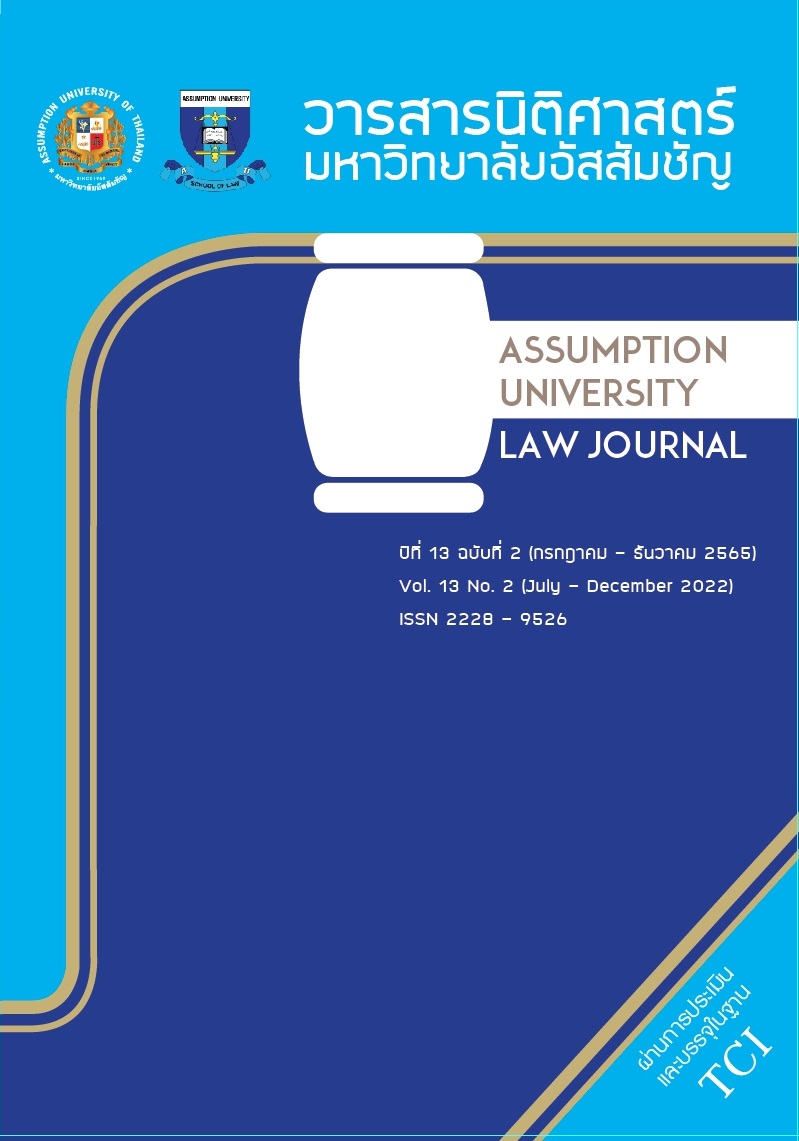การพัฒนากฎหมายว่าด้วยการจัดการนิติบุคคลหมู่บ้านจัดสรรในประเทศไทย
The Development of Laws Related to the Management of Housing Estate Juristic Person in Thailand
Keywords:
ค่าส่วนกลาง, คณะกรรมการหมู่บ้านจัดสรร, การกากับดูแลนิติบุคคลหมู่บ้านจัดสรร, สมาชิกนิติบุคคลหมู่บ้านจัดสรร, Housing Estate Juristic Person, Common Fees, Housing Estate Committee, Corporate Governance of Housing Estate Juristic Person, Members of Housing Estate Juristic Person’s rights.Abstract
บทคัดย่อ
ประเทศไทยมีพระราชบัญญัติการจัดสรรที่ดิน พ.ศ. 2543 ที่กาหนดเรื่องนิติบุคคลหมู่บ้านจัดสรรขึ้นเป็นครั้งแรก แต่จนกระทั่งปัจจุบันยังไม่มีบทบัญญัติที่ครอบคลุมถึงการจัดการนิติบุคคลหมู่บ้านจัดสรรและการกากับดูแลอย่างเป็นระบบ โดยการที่รัฐให้เสรีภาพแก่เอกชนในการบริหารจัดการกันเองโดยไม่ได้บัญญัติกฎหมายในการกากับดูแล ทาให้เกิดปัญหาข้อพิพาทระหว่างสมาชิกในหมู่บ้านจัดสรรในการใช้พื้นที่และทรัพย์สินส่วนกลางที่เกิดจากความไม่เข้าใจสิทธิและหน้าที่ของตน ปัญหาระหว่างสมาชิกและคณะกรรมการที่ไม่ไว้วางใจในการบริหารจัดการของคณะกรรมการ ปัญหาการทุจริต การทางานที่ไม่โปร่งใส ไม่มีการตรวจสอบและถ่วงดุลอานาจของคณะกรรมการที่เพียงพอ ซึ่งก่อให้เกิดปัญหาการจัดเก็บค่าใช้จ่ายส่วนกลางได้ไม่ครบถ้วนเนื่องจากสมาชิกปฏิเสธการชาระเพื่อตอบโต้ปัญหาการทางานของคณะกรรมการ ส่งผลให้สาธารณูปโภคส่วนกลางที่สมาชิกใช้ร่วมกันต้องเสื่อมโทรมลง คุณภาพชีวิตของประชาชนลดลงไม่เป็นไปตามวัตถุประสงค์ในการตราพระราชบัญญัติการจัดสรรที่ดิน พ.ศ. 2543 และยังทาให้สังคมหมู่บ้านจัดสรรอยู่อย่างไม่สงบ เกิดปัญหาความขัดแย้งภายในหมู่บ้านจัดสรรที่ควรจะต้องอยู่ร่วมกันเป็นชุมชนที่อยู่กันอย่างผาสุก ปัญหาข้อพิพาทยังนาไปสู่การฟ้องร้องคดีต่อศาลจานวนมาก การศึกษานี้มีวัตถุประสงค์ 1. เพื่อศึกษาสถานะของกฎหมายของนิติบุคคลหมู่บ้านจัดสรร โครงสร้างองค์กร อานาจ หน้าที่และการได้มาซึ่งคณะกรรมการหมู่บ้านจัดสรร การคุ้มครองสิทธิของสมาชิก และรูปแบบการกากับดูแลจากภาครัฐหรือภาคเอกชนที่มีอยู่ในปัจจุบัน 2. เพื่อศึกษาหลักกฎหมายที่เกี่ยวข้องกับสถานะของกฎหมายของนิติบุคคลหมู่บ้านจัดสรร โครงสร้างองค์กร อานาจหน้าที่และการได้มาซึ่งคณะกรรมการหมู่บ้านจัดสรร การคุ้มครองสิทธิของสมาชิก และศึกษารูปแบบกฎหมายต้นแบบของต่างประเทศ ได้แก่ กฎหมายของรัฐฟลอริด้า ประเทศสหรัฐอเมริกา และรัฐนิวเซาท์เวลล์ ประเทศออสเตรเลีย 3. เพื่อเสนอแนวทางแก้ไขพระราชบัญญัติการจัดสรรที่ดิน พ.ศ.2543 และกฎหมายที่เกี่ยวข้องในการพัฒนารูปแบบการบริหารจัดการหมู่บ้านจัดสรร การคุ้มครองสิทธิของสมาชิกหมู่บ้านจัดสรรรวมทั้งการกากับดูแลนิติบุคคลหมู่บ้านจัดสรร เพื่อให้การบังคับใช้กฎหมายเป็นไปได้อย่างมีประสิทธิภาพและมีความเป็นธรรมที่สอดคล้องกับบริบททางสังคมและเศรษฐกิจต่อไปในอนาคต การศึกษานี้ใช้วิธีวิจัยเชิงเอกสาร (Documentary Research) โดยศึกษาจากบทบัญญัติกฎหมายต่างๆ ที่เกี่ยวข้อง รวมถึงคาพิพากษา คาวินิจฉัยของศาลที่เกี่ยวข้องกับการจัดการนิติบุคคลหมู่บ้านจัดสรร ทั้งของไทยและต่างประเทศในฐานะข้อมูลปฐมภูมิ และศึกษาวิทยานิพนธ์ งานวิจัย บทความ ทางวิชาการ บทวิเคราะห์ ในฐานะข้อมูลทุติยภูมิ รวมทั้งศึกษาหลักกฎหมายและทฤษฎีที่สาคัญในเรื่อง นิติบุคคล การจัดการทรัพย์สินส่วนรวม หลักกรรมสิทธิ์รวม หลักกรรมสิทธิ์ร่วม หลักตัวการตัวแทน เป็นต้น ผลการวิจัยพบว่า นิติบุคคลหมู่บ้านจัดสรร เป็นองค์กรที่จัดตั้งขึ้นมาเพื่อบริหารจัดการทรัพย์สินอันเป็นสาธารณูปโภคที่ใช้ร่วมกันของสมาชิก โดยสมาชิกมีหน้าที่ตามกฎหมายที่ต้องชาระค่าใช้จ่ายตามหลักเกณฑ์ที่กฎหมายกาหนด ทั้งนี้เพื่อให้สาธารณูปโภคของหมู่บ้านได้รับการดูแลให้อยู่ในสภาพดี สมาชิกอยู่ร่วมกันอย่างสงบสุข เพื่อให้คุณภาพชีวิตที่ดีแก่สมาชิกในหมู่บ้านและเพื่อลดภาระของภาครัฐในการจัดการสาธารณูปโภค ในการบริหารจัดการที่ภาครัฐปล่อยให้เป็นหน้าที่ของเอกชนนั้น หากเกิดปัญหารัฐควรเข้ามาทาหน้าที่ในการกากับดูแลและจัดการข้อพิพาท ปัญหาในปัจจุบันพบว่ามีปัญหาข้อพิพาทในสังคมหมู่บ้านจัดสรรมีความขัดแย้งกันที่มีสาเหตุหลักมาจากการบริหารจัดการของนิติบุคคลหมู่บ้านจัดสรร ที่ให้อานาจคณะกรรมการอย่างกว้างขวาง โดยไม่มีการกากับดูแลจากภาครัฐที่เพียงพอ ทาให้สมาชิกไม่ได้รับความเป็นธรรม และตอบโต้ด้วยการไม่ชาระค่าใช้จ่าย ทาให้สาธารณูปโภคไม่ได้รับการดูแลรักษาที่เพียงพอ เกิดความเสื่อมโทรม ไม่เป็นไปตามเจตนารมณ์ของกฎหมาย และคดีหมู่บ้านจัดสรรเป็นคดีที่มีลักษณะที่ต่างจากคดีแพ่งทั่วไปที่คู่กรณีต้องอยู่ร่วมกันในหมู่บ้านเดียวกันต่อไป จึงควรที่จะต้องมีรูปแบบการไกล่เกลี่ยข้อพิพาทที่ได้รับการเอาใจใส่ให้สามารถกลับไปอยู่ร่วมกันได้อย่างปกติสุขในสังคมเดียวกันต่อไป ผู้ศึกษาจึงมีข้อเสนอแนะ ให้มีรูปแบบการจัดตั้ง การบริหารและ การกากับดูแลจากภาครัฐในการบริหารจัดการนิติบุคคลหมู่บ้านจัดสรร โดยแก้ไขเพิ่มเติมพระราชบัญญัติการจัดสรรที่ดิน และตรากฎหมายลำดับรองเพื่อรองรับหน่วยงานกากับดูแล รวมไปถึงหน่วยงานที่ทาหน้าที่ในการไกล่เกลี่ยข้อพิพาท เพื่อลดภาระของศาลยุติธรรม
Abstract
In Thailand, the “Housing Estate Juristic Person” is established in accordance with the “Land Allocation Act B.E. 2543 (2000)” or the “Act”. However, until present, there have not been enough provisions to systematically cover the management of the Housing Estate Juristic Person, causing problems in Housing Estate communities, such as disputes between members related to the use of common properties, from members’ rights and responsibilities not being properly addressed, disputes between members and committees arising from distrust of the management, corruption and non-transparent management. Moreover, there are no provisions for checks and balances. These issues lead to problems with the collection of common fees resulting from members’ refusal to pay in response to the aforementioned management problems. This leads to the public facilities becoming deteriorated, members’ quality of life being decreased and a failure to achieve the purpose of the Act. This has also resulted in numerous cases brought before the court. This study aims 1. to study the existing law related to the establishment, authority and responsibility of the committee in relation to the Housing Estate Juristic Person, 2. Study legal principle in relating to the establishment, authority and responsibility of the committee in relation to the Housing Estate Juristic Person and studying law model from the State of Florida, United States of America and the State of New South Wales, Australia 3. to find a suitable approach to develop the laws related to management of the Housing Estate Juristic Person in Thailand. This study’s research methodology is documentary research, by studying the relevant legal provisions, the court judgement both in Thailand and foreign countries as primary source. Studying theses, research documents, academic documents, analysis articles as secondary sources. In addition, studying related legal principles and theories which are the principle of Legal Entity, the management of common properties, principle of joint ownership, and tenancy in common, law of agency etc. The study outcome showed that the Housing Estate Juristic Person is a specific legal entity established to manage the common properties, jointly utilized by its members. Giving that members are having their legal duty to pay for expenses by law. This is to ensure that the common properties are well maintained in good condition and members enjoy living peacefully with good quality of life which will decrease public sector’s responsibilities as utilities provider. By giving the private sector freedom to manage themselves, if there are problem public sector should step in to supervise and resolve disputes. At present, there are numerous disputes in Housing Estate Communities mostly caused from lack of good management, the existing law giving broadly power to committee with not enough supervision. Causing unfair treatment to members who then responded to be in default on payment of common fee. Finally, the common properties are deteriorated lack of maintenance this is not meet the purpose and objective of the Law. Additionally, the Housing Estate dispute cases are different from traditional civil cases which the dispute parties will be living in the same community after case resolved. The form of dispute resolution should be more carefully taken care of to restore peacefully living in the community. The study therefore has suggested to provide form establishment and management of Housing Estate Juristic Person and supervision from public sector in management of Housing Estate Juristic Person by suggested for amendment of Land Allocation Act B.E. 2543 and related secondary law to support supervision from public sector. In addition, to provide alternative dispute resolution unit, to reduce dispute case in Housing Estate Juristic Person cases.
Downloads
Published
Issue
Section
License
- บทความทุกเรื่องได้รับการตรวจทางวิชาการโดยผู้ทรงคุณวุฒิ (Reader) จากภายในและนอกมหาวิทยาลัย
- ความคิดเห็นใดๆ ที่ลงตีพิมพ์ในวารสารกฎหมายคณะนิติศาสตร์ มหาวิทยาลัยอัสสัมชัญ เป็นของผู้เขียน (ความคิดเห็นใดๆ ของผู้เขียน กองบรรณาธิการวารสารกฎหมายคณะนิติศาสตร์ มหาวิทยาลัยอัสสัมชัญไม่จำเป็นต้องเห็นด้วย)
- กองบรรณาธิการวารสารกฎหมายคณะนิติศาสตร์ มหาวิทยาลัยอัสสัมชัญ ไม่สงวนสิทธิในการคัดลอก แต่ให้อ้างอิงแสดงแหล่งที่มาด้วย


